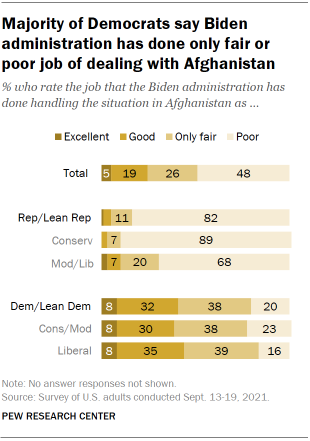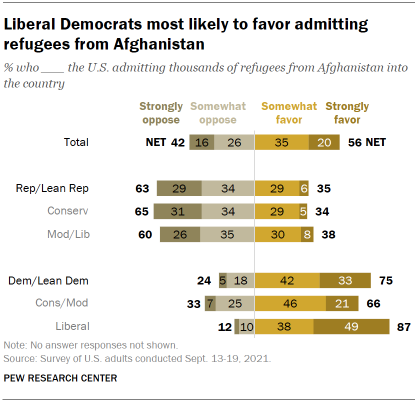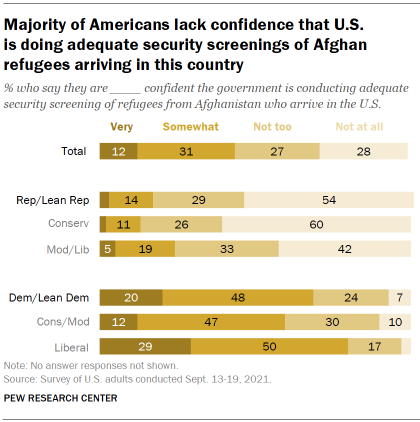A few weeks after the United States withdrew its last troops from Afghanistan, the Biden administration continues to receive low marks for its handling of the situation there.

About a quarter of Americans (24%) say the administration has done an excellent or good job in dealing with the situation in Afghanistan; 26% say it has done an only fair job, while 48% say it has done a poor job.
These views are little changed from late August, when the U.S. military withdrawal from Afghanistan was in progress.
As was the case in August, Republicans assess the administration’s handling of the situation in Afghanistan more negatively than Democrats.
Democrats remain divided over the administration’s performance: Four-in-ten say the administration has done an excellent or good job on the situation in Afghanistan; a similar share (38%) say it has done an only fair job, while 20% say it has done a poor job.
In contrast, a large majority of Republicans and Republican-leaning independents (83%) say the Biden administration has done a poor job handling the situation in Afghanistan. Conservative Republicans are 20 percentage points more likely than moderate and liberal Republicans to say this.
The U.S. evacuated thousands of Afghans from the country in the last weeks of August. Most Americans (91%) say they have heard at least a little about Afghans fleeing their country and coming to the U.S.; 39% say they have heard a lot about this.

A majority of the public (56%) say they favor admitting thousands of Afghan refugees to the U.S., while 42% are opposed. These views are deeply divided by partisanship.
More than six-in-ten Republicans (63%) either strongly (29%) or somewhat (34%) oppose the U.S. admitting thousands of refugees from Afghanistan into the country. About a third (35%) say they favor admitting these refugees.
Democrats largely favor the U.S. admitting thousands of Afghan refugees. Three-quarters are in favor, including a third who say they strongly favor this. Liberal Democrats (87%) are more likely than conservative and moderate Democrats (66%) to favor this. About half of liberal Democrats (49%) say they strongly favor admitting these refugees.
There are also wide partisan gaps in views of whether the U.S. government is conducting sufficient security screening of refugees from Afghanistan.

Overall, about one-in-ten Americans say they are very confident that the government is conducting adequate security screening of refugees arriving in the U.S. from Afghanistan; 31% say they are somewhat confident, 27% say they are not too confident and 28% say they are not at all confident that the government is adequately screening refugees.
Republicans are broadly skeptical of the job the government is doing: 54% say they are not at all confident that the U.S. government is conducting adequate security screening of refugees. This includes six-in-ten conservative Republicans. Moderate and liberal Republicans are slightly more confident in the screening process, though three-quarters say they are not too (33%) or not at all confident (42%) the government is providing adequate screening.
Two-thirds of Democrats say they are at least somewhat confident that the government is conducting adequate security screening of refugees from Afghanistan. About three-in-ten liberal Democrats say they are very confident in this, compared with 12% of moderate and conservative Democrats.
CORRECTION (Aug. 16, 2022): A previous version of this report misstated the share of Republicans who rated the Biden administration’s handling of the situation in Afghanistan as poor (82%), as well as the difference between conservative Republicans and moderate/liberal Republicans who gave this rating (21 points). The figures in the chart were correct. This change does not affect the report’s substantive findings.




